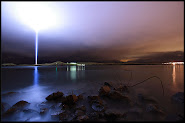"My question to you -- because we've talked a great deal on this program about hydraulic fracturing wherein water is injected along with chemicals into shale in order to release gas. To what extent do you believe that hydraulic fracking could have played a role in this particular earthquake?"
He replied:
Well, for this particular earthquake, we're not aware of any specific activity in that area that would likely have been a trigger. But we have seen association elsewhere.
For example, in Arkansas, we've had quite a swarm of earthquakes in this past year that folks at the Arkansas Geological Survey have been working on the linkage not to the fracking itself, where in a sense you're trying to find places where the rock is not broken up. And you're breaking it up, so you can generate lots of little earthquakes.
But you don't have the kind of big structures or faults that would normally be a conduit that you would have used normally. But you're doing wastewater injection then, very high-pressure injection back into the ground. And there has -- there have been -- well, there are a number of famous cases of linkage there.
Probably the most famous was the Rocky Mountain Arsenal out near Denver, back in the '60s, where they were doing high-pressure injection and managed to generate over a magnitude 5 earthquakes. I think the key thing here is, as this becomes a more common practice, is recognizing that people will be feeling earthquakes in places they're not used to.



















No comments:
Post a Comment